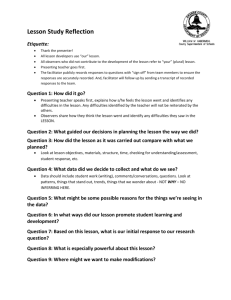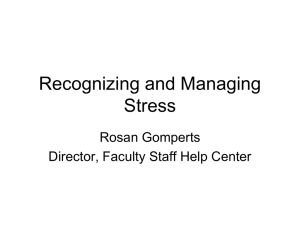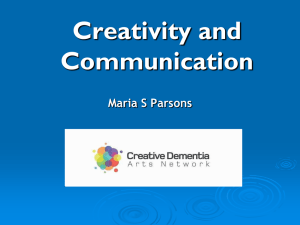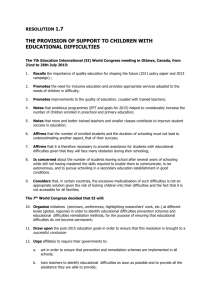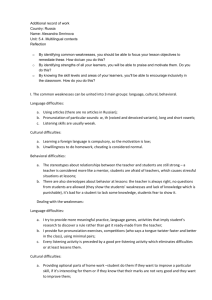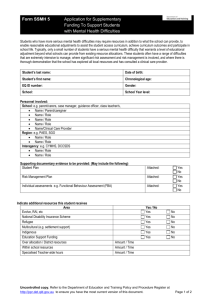Reading Checklist
advertisement
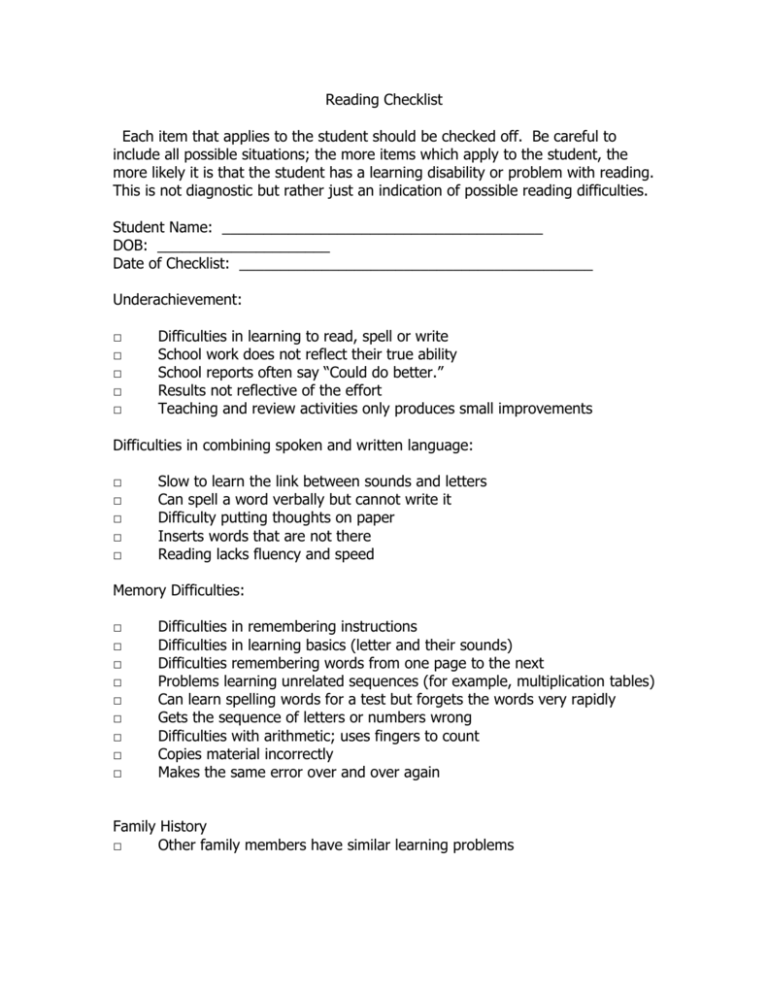
Reading Checklist Each item that applies to the student should be checked off. Be careful to include all possible situations; the more items which apply to the student, the more likely it is that the student has a learning disability or problem with reading. This is not diagnostic but rather just an indication of possible reading difficulties. Student Name: _______________________________________ DOB: _____________________ Date of Checklist: ___________________________________________ Underachievement: □ □ □ □ □ Difficulties in learning to read, spell or write School work does not reflect their true ability School reports often say “Could do better.” Results not reflective of the effort Teaching and review activities only produces small improvements Difficulties in combining spoken and written language: □ □ □ □ □ Slow to learn the link between sounds and letters Can spell a word verbally but cannot write it Difficulty putting thoughts on paper Inserts words that are not there Reading lacks fluency and speed Memory Difficulties: □ □ □ □ □ □ □ □ □ Difficulties in remembering instructions Difficulties in learning basics (letter and their sounds) Difficulties remembering words from one page to the next Problems learning unrelated sequences (for example, multiplication tables) Can learn spelling words for a test but forgets the words very rapidly Gets the sequence of letters or numbers wrong Difficulties with arithmetic; uses fingers to count Copies material incorrectly Makes the same error over and over again Family History □ Other family members have similar learning problems Speech, phonological, and language difficulties □ □ □ □ □ □ □ □ □ Problems with word-finding when speaking Problems pronouncing long words Problems breaking words into sounds Difficulties in blending sounds together Difficulties in recognizing or producing rhymes Difficulties in learning phonics Later than average in learning to talk History of early ear infections Written language poorly structured Visual Motor Difficulties □ □ □ □ □ □ □ □ □ □ Slow to learn how to write Poor class work—untidy, slow, messy Mixes upper and lower case letters Difficulties in working as fast as other students Poor coordination; clumsy Loses place when reading; uses finger to keep track Letter and number reversals after the age of seven Disliked puzzles and drawing as a younger child Difficulties with sustained writing; hand gets tired very quickly Poor posture; slumps on desk when working; fidgets sitting on the floor Concentration Difficulties □ □ □ □ □ □ □ □ Inattentive; in a daydream Easily distracted Diagnosed as having ADD Often restless and fidgety Often impulsive; does not stop and think; calls out in class Makes many careless errors Cannot read for more than a short period of time Poor organization; often forgets books, or class materials Social and Emotional Difficulties □ □ □ □ □ Avoids learning tasks; “loses” books; wastes time; “forgets” homework Does not expect to succeed so does not try Gets frustrated and upset when effort does not produce good results Reluctant to accept help; does not like to be different Told to “try harder” even when working very hard The Most Commonly Used 100 Words: Set 1: a in he am the big will come mother said Set 2: it I is go me car and father look home Set 3: like get have can do boy to see good you Set 4: no here girl all up at that one this she Set 5: of was we jump are play down my live thing Set 6: when new did name yes run with don’t what little Set 7: take put him on some his went into not has Set 8: two know can’t her brother over three sister them make Set 9: take put him on some his went into not has Set 10: bring fall too by let be fast want only made
